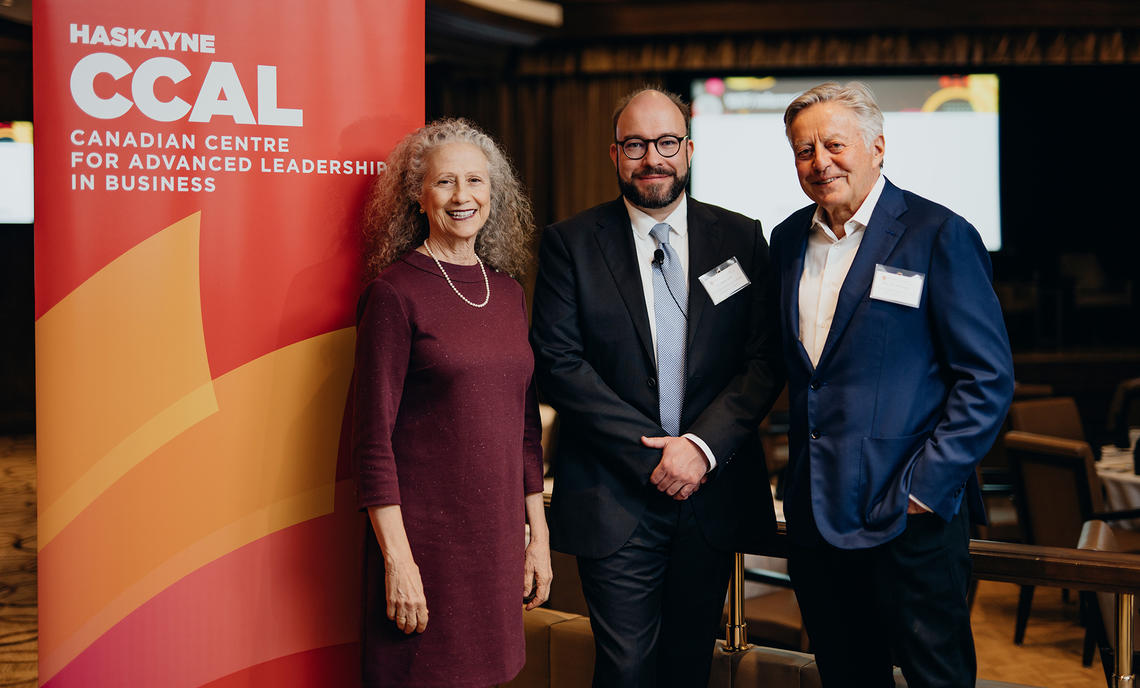June 20, 2022
Celebrating 10 years of leadership excellence at the Haskayne School of Business

This year marks the 10th anniversary of the Canadian Centre for Advanced Leadership in Business (CCAL) at the Haskayne School of Business. And what a decade it’s been. Last year alone the Centre worked with more than 500 business community members across the globe, connected more than 2,900 students to leadership learning opportunities and ran a mentorship program that has grown 170 per cent in engagement since its inception.
- Photo above: Dr. David Day, PhD, a professor of psychology and leadership at Claremont McKenna College and the academic director of the Kravis Leadership Institute, speaks during the CCAL summit.
The Centre recently hosted its annual leadership summit, which has received an incredible response from its community of academics, students and business leaders. The 2022 summit featured a hybrid format and brought in local and international practitioners and academics. From May 9 to 19, the summit hosted five live sessions, shared three digital resource packages and had more than 170 attendees.
Exploring the inconvenient truths about leadership development
Dr. David Day, PhD, academic director of the Kravis Leadership Institute in California, joined the CCAL community for an in-person session during the five-day summit. Day, widely known as one of the world’s most prominent researchers of leadership, spoke about the difference between leadership and leadership development.
“Leadership research has been conducted for 120 years. Leadership development, on the other hand, is a commodity that you can sell, for example, assessments and packages. It’s largely been taken over by practitioners and we don’t have any evidence that they work,” said Day. “My focus on studying leadership development is to move from nonsense to substance.”

Dr. Joanne Ciulla with Rutgers Business School, joins UCalgary’s Dr. David Dick and CCAL co-founder Mac Van Wielingen at the summit kick-off event.
Kelly Hofer
He went on to say that not all leadership development is created equal and that they are often “episodic, bounded in time and space, and don’t allow for ongoing leadership practice.” Day stressed that leadership-development programs should be rooted in evidence-based practice. This has been a strategic focus for CCAL over the past three years.
Business ethics and stakeholder theory
Dr. R. Edward Freeman, PhD, professor at the University of Virginia Darden School of Business, joined the summit virtually. He is widely known throughout the practice of management as the father of stakeholder theory, which states that stakeholder needs must be taken into consideration in addition to providing value to shareholders. According to Freeman, what gave the theory legs was the world financial crisis when it came abundantly clear that business must consider both purposes and profit.

Summit presenter Dr. R. Edward Freeman from the University of Virginia last visited the Haskayne School of Business in 2020.
Riley Brandt, University of Calgary
How can organizations adopt stakeholder theory into their practices? Freeman explained that one simple word can shift their perspective: and. “Purpose is the wellspring of profit," he said. "We’re entering a phase where businesses are learning how powerful purpose is. It’s purpose and profit. Not purpose or profit.”
Evidence-based research as an area of focus
CCAL has made great strides in its three areas of focus: leadership learning, business ethics and evidence-based research. Its efforts in leadership research have seen immense impact. Each CCAL initiative has an element of research embedded into it. Over the last two years, CCAL secured more than $500,000 in funding to launch the Longitudinal Leadership Development Study. Under the lead of Dr. Nick Turner, PhD, distinguished research chair, the CCAL research team has published 44 peer-reviewed articles and six white papers and received 10 research grants.
Learn more or get involved with CCAL by visiting its website.
